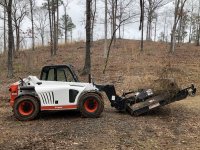I am a "city slicker" with no experience with tractors.
The fundamental importance of TRACTOR WEIGHT eludes many tractor shoppers. Tractor weight is more important identifying compact tractor capability than tractor horsepower.
The most efficient way to shop for tractors is to first identify potential tractor applications, then, through consulataton, establish bare tractor weight necessary to
safely accomplish your applications. Tractor dealers, experienced tractor owners and TractorByNet.com are sources for weight recommendations.
Bare tractor weight is a fundamental tractor specification easily found in sales brochures and web sites, readily comparable across tractor brands and tractor models, new and used. Shop your weight range within tractor brands. Budget will eliminate some choices. Collect a dealer brochure for each tractor model in your weight range.
I spreadsheet tractor and implement specs, often a revealing exercise which cuts through specification clutter. I have a column for cost per pound.
Selling a used tractor is easy. Selling multiple light implements in order to buy heavier, wider implements for a new, heavier tractor requires a lot of time. Depreciation on implements is worse than depreciation on a tractor.
A quality dealer, reasonably close, available for coaching, is important for tractor neophytes. Most new tractors are delivered with a glitch or two requiring correction. My kubota dealer is six miles away. I feel my local dealer continues to add value to my equipment after eight years. Dealer proximity is less important for those experienced with tractors and qualified to perform their own maintenance.
BUY ENOUGH TRACTOR.
I've found a 2038r in North Florida for what I consider an acceptable deal in these current times.
The Deere 2038r is in the lighter tranche of compact tractors at 2,500 pounds bare tractor weight. Compact tractors under 3,000 pounds bare weight operate in landscape, kitchen/commercial garden or hobby farm applications on one to ten
flat acres. I would consider the forward PTO of the Deere 2038r or any other light tractor a damage prone hindrance on slopes or in woods.
For 105 acres, reclamation and maintenance I recommend a wider, heavier tractor weighing 3,500 to 4,500 pounds bare tractor weight.These are the mid-weights in the compact tractor category and sell in high unit volumes. Every tractor brand has at least an economy and deluxe compact tractor model in this weight.
Tractors are inherently unstable operating on sloped ground. Tractor rear wheel/tire spread, sometimes adjustable, is a critical factor increasing compact tractor stability working sloped or uneven ground. A 6" to 10" wider rear axle substantially decreases tractor rollover potential.
As part of property maintenance of 100 acres of forest you will need to pick up tree trunk sections weighing 1,000 to 2,000 pounds on a regular basis.
T-B-N ARCHIVE:
TRACTOR FOR STEEP HILLS SLOPES MOUNTAINS site:tractorbynet.com
When considering a tractor purchase, bare tractor weight first, tractor horsepower second, rear axle width third, rear wheel/tire ballast fourth.
RELEVENT THREADS FROM THE T-B-N ARCHIVE:
tractor for sloped hilly steep ground site: tractorbynet.com

